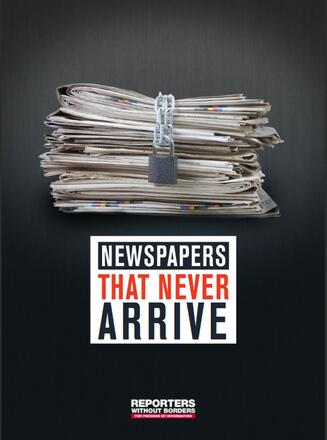
Through a very rich overview of cases around the world, this report highlights a usually neglected stage in the production of newspapers: the chain from printing to selling.
“Press freedom is based not only on the ability of journalists and their news organizations to work without constraint or fear, but also on the freedom to circulate the product of their work”.
According to the report, any interference or any impediment in this process limits the public’s access to information, and thus interferes with people's right to be informed.
“According to a survey by Reporters Without Borders (RSF) in more than 90 countries, 68% of cases of obstruction in the circulation of newspapers are attributable to governments and state authorities, while 41% of cases of newspaper censorship take place at the point of sale”.
Censorship in this area has different faces: from violence (killing a newspaper seller) to other forms of control.
In its 3 chapters, the report analyses the risks in the 3 main stages of birth and distribution of a newspaper: when the newspaper disappears from the stalls (“Readers with no newspapers to buy”), when the newspaper does not even get there (“The many pitfalls of print media delivery”), and when the newspaper cannot even be printed (“Printing – A fragile stage in the process”).
The Recommendations
The report features 3 recommendations for governments:
- to respect their international obligations regarding the dissemination of a free, diverse, and independent press. That is why they should prevent any arbitrary obstruction of the free circulation of media and ensure that state assistance for the press is allocated equitably;
- to ensure effective prevention of any obstruction of the dissemination of a free, diverse, and independent press. In particular, they should publicly condemn obstacles to the dissemination of news and information, guarantee the physical safety of press publishers, printers, distributors, and vendors, make it a crime to obstruct the dissemination of the press, ensure a proper legislative and economic framework against the creation of monopolies, and make sure that those involved in distribution are properly trained in press law so that they report any obstruction to the authorities;
- to reinforce prevention by punishing violations of press dissemination quickly and effectively, through systematic and rapid investigations and an effective judicial follow-up by means of a national observatory of obstacles to press dissemination.
The content of this article can be used according to the terms of Creative Commons: Attribution-NonCommercial 4.0 International (CC BY-NC 4.0) . To do so use the the wording "this article was originally published on the Resource Centre on Media Freedom in Europe" including a direct active link to the original article page.

